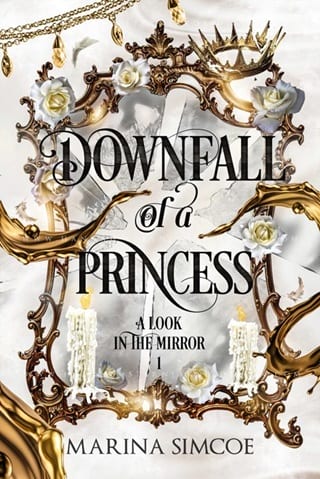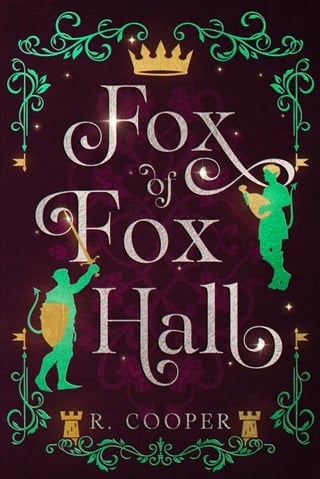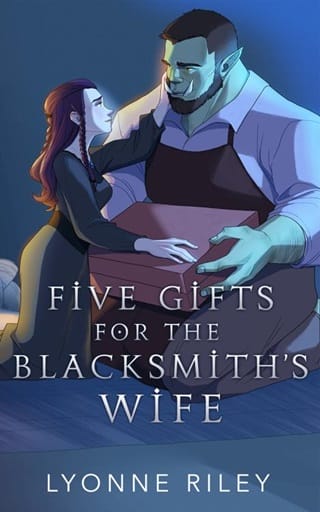Chapter 12
Ari
D ressed in a cream-colored suit, freshly shaven, with his hair styled, Father met me in a drawing room downstairs a few days later.
“Market days are the best, aren’t they?” He placed a peck on my forehead in greeting.
His smile was like a breath of fresh air in the days since I’d kicked Salas out of my bedroom.
I’d spent that night curled in my bed, wrapped in a blanket, but I didn’t remember sleeping. Every time I’d closed my eyes, another memory would spring on me, leaving me feeling filthy and ashamed.
Things had been done to me by people who felt no shame, leaving me burning with shame for the rest of my life instead. It made no sense. But that was the cruelty of it. It hadn’t been enough to survive, I was condemned to reliving it over and over again in my mind, in a maddening, never-ending cycle.
In the morning, I’d put myself together the best I could, had a coffee, and went on with my day. Only something had been off ever since.
I used to find solace in the palace library filled with thick scrolls and books on ancient laws that had withstood the test of time. Coming to the council meeting room never failed to reassure me in the wisdom of our foremothers. The many queens, who had come before my mother, passed on the legacy of fairness in justice and intelligence in governance. From the moment I’d arrived here, Rorrim had seemed like the ideal society that others should strive to replicate. It had its problems, of course, but it also had functioning ways to solve them.
Now, the echo of Salas’s words never quieted.
“Take a look outside the palace walls, Princess.”
What did I miss?
Or maybe it wasn’t me? Maybe Salas was mistaken? An isolated case of injustice didn’t mean that the whole establishment was flawed.
Salas had gone through some hard times and ended up at the very bottom of society. It had undoubtedly left him feeling bitter. Maybe he didn’t get the justice he thought he deserved. In that case, I should’ve talked to him. Unfortunately damaged and fragile as I felt that night, I couldn’t offer him any support at the time. And after the way I’d kicked him out, he might never want to speak with me again.
Gem had returned my diamonds the very same day.
“A palace guard brought them this morning.” She stared at me, clearly expecting an explanation. “Your slave gave them to her. Did he steal them, then came to his senses? Royal jewelry wouldn’t be easy to sell without risking an arrest for theft.”
“I gave them to him. There was no theft.” I took the earrings and the necklace from her, then tossed them back on the side stand in my bedroom.
“Why would you give a priceless jewelry set to a slave? What was he supposed to do with it?”
It had been such a stupid thing to do. I had no explanation to give to Gem, other than I’d panicked. I was not in my own mind that night. My life still felt off balance. The entire world did.
But Gem kept staring at me, expecting a logical answer. I gave her the best thing I could come up with.
“I gave it to him as a thank you for his services. He left me very satisfied.”
My answer had the expected result. Gem smirked.
“Did he now? He was that good, was he?” She sidled closer for juicy details, but I refused to give her anything more.
Whatever happened between Salas and me belonged to us and no one else. I could only hope he felt the same way too.
“Obviously, it was a useless present for him,” I said casually. “I realized that and replaced it with a full payout of his contract, instead.”
Just a day after, the queen had successfully petitioned the council for his freedom. Salas was a free man now. He could leave Egami or even Rorrim if he so wished. Maybe he had already done so.
I hid a sigh as Father adjusted the lapels of his suit jacket. He seemed excited about me fulfilling my promise to take him to the market today, and I didn’t want my troubled mood to spoil his day.
“We’ll have to let Her Majesty know we may be late for lunch,” he said, offering me his arm.
“I already did.” I threaded my hand through the crook of his elbow. Together, we headed to the carriage that waited for us in the courtyard. “I left a message with the queen’s maid. If we’re late, I’m sure Mother will forgive us. It’s not every day that I get a chance to go shopping with you.”
The market was busy that day. It was a good thing that I came with Father. As a man, the king would've been required to bring at least a few of his gentlemen-in-waiting when going out in public, along with an escort of guards. With me, he only needed a couple of royal guards. A female relative, regardless of her age, was believed to be better suited to protect a man’s reputation than a whole army of male friends.
As a much smaller group, we moved through crowds more easily, browsing the rows of merchants’ stalls.
“Did you want to find some gloves?” I asked, remembering him mentioning that he could use some.
“Not really.” He grinned somewhat sheepishly. “Frankly, I have more gloves than I know what to do with. It’s just nice to get out of the palace sometimes, isn’t it?”
Men, especially high-born men, often ended up house-bound for their own peace and safety since the outside world harbored too many temptations and aggravations. But it also allowed the wives to keep a better eye on their husbands in the world where male reputation could be so easily soiled by just a wrong look or a careless word from someone.
“Oh, these are nice.” Father stopped in front of a table with folded linen and stroked a brushed-cotton shirt. “So soft.”
“And comfy too, Your Majesty,” the merchant rushed to praise her wares.
“They are nice,” I agreed, stroking a shirt too. “I have pajamas like that. Perfect for winter.”
“You’re right, Your Highness.” The seller nodded eagerly. “But they’re fine enough to wear during the day too. Look at this one.” She unfolded the shirt I’d touched.
It was creamy white, with a narrow strip for a collar and small horn buttons halfway down the chest. A simple cross-stitch embroidery on the collar and around the buttons made it look tastefully festive. I could see a farmer’s husband wearing it to a fair. He’d give the best hugs, too, wearing something so soft.
Father shook his head, taking his hand off the fabric.
“It’s way too plain for me,” he said quietly, for only me to hear. “I’d have nowhere to wear it.”
“How about to bed? As a nightshirt?” I suggested.
He shook his head again, stepping away from the merchant’s stand. “The queen prefers I wear silk to bed.”
I opened my mouth to ask what he preferred but quickly closed it, realizing he might not know the answer to that question.
Father was betrothed to my mother when he was sixteen and she was thirty. They got married two years later, the day after he turned eighteen. He spent his childhood striving to please his parents by being the perfect son. Since the wedding, he’d been pleasing his wife by being the perfect husband. He’d learned all about her preferences, but never really had a chance to figure out his own. He’d been a son, a husband, and a father, but never had a chance to be a man outside of these roles.
We finished our trip through the market with Father acquiring a pair of kid-skin gloves for himself and a silver-tipped writing quill as a gift for Mother.
As he climbed back into the carriage, I paused by the open door.
“I’m so sorry, I almost forgot,” I said. “Do you mind waiting for just a minute while I run to get something?”
Leaving my father in the care of the guards, I dashed back to the market stalls. I returned a few minutes later with a fabric bundle in my hands.
“Here, I got something for you,” I said, taking my place in the carriage next to Father. “I thought you’d like it.” I pulled a book out of the bundle and handed it to him. “It’s an illustrated commentary to the eleventh volume of the Complete Political History of Rorrim by Lady Arima. She’s lauded as the most insightful historian of the current century. I found her commentary very helpful.”
Father stared at me in alarm, as if expecting me to either ridicule him or threaten to expose his reading habits to the world. His skin turned paler than marble. A ripple ran over it, matching the burgundy upholstery inside the carriage, before he all but blended in with it. His body, hair, and clothes appeared transparent, reflecting the panels and cushions of the carriage. Fear prompted him into hiding with the reflex that people in Rorrim had little control over.
My heart ached for him.
“Oh, Father.” I lunged forward and grabbed him into a tight hug. “Please, don’t be scared. I promise I’ll never tell anyone what you’re reading.”
I knew my father was content with the way his life had turned out. He even considered himself lucky. Until now, I had wholeheartedly agreed with him. But it no longer felt that way. How lucky could one really be if he had to read in secret?
He released a long breath as I petted his back soothingly. The fabric of his suit slowly returned to its original ivory color. I waited until his reflection had passed completely before releasing him from my hug.
“Are you alright?” I asked softly.
He clasped his hands in his lap.
“It’s not a crime, dearest. I haven’t broken any laws by reading those books.” He sounded as if trying to convince himself more than me. “It’s simply in bad taste. Some study subjects are just not suitable for men. Learning advanced mathematics, for example, dries the male brain out and makes us bitter and aggressive. History has many difficult topics that may upset us. And politics... Well, it’s best for men to stay out of politics—”
I placed a hand on his, stopping his words that parroted what he’d been told probably all his life.
“You’re right, it’s not a crime wanting to learn the history of the country you’ve lived in for two decades now. And history is messy. It’s filled with wars and political games, with suffering and hatred. If you learn it, you can’t pick and choose. You need to know it all—good, bad, and outright disturbing. And if it upsets you... Well, you are a grown man. I’ve seen you control your emotions in public better than many people I know. I’m pretty sure you’re capable of deciding for yourself what you want to read and how much you can handle being upset.”
He placed the book onto his lap, running his fingers over the embossed leather. I waited for him to say something, but he just stared at it, seemingly lost for words.
“Look.” I opened the cover for him. “It has detailed maps of territories affected by each major treaty, which gives a good visual of the reasoning behind all those agreements.”
He gasped, poring over the maps with growing enthusiasm.
“This is wonderful. Thank you so much, Ari.”
“You’re welcome,” I said, hiding the rest of my bundle behind a seat cushion. I had another present there, but it wasn’t for my father, it was for someone else.
“Ari?” Father asked, lifting his gaze from the book. “Do you think there is a place anywhere in the universe where boys are allowed to study history and politics freely?”
His question rendered me speechless. Father had never talked to me about the world I’d come from before.
Mother had spotted me on her way from Father’s chambers one dark night. She held a candle in her hand to light her way back to her rooms. The candle flame reflected in the large, ancient mirror hanging in the throne room. Only instead of her reflection, she saw my face in it. That happened the night I stared into the mirror corridor, the very same night I ran away from that wretched house I used to call home.
Since then, Mother had stood in front of the ancient mirror often, trying to catch a glimpse of me. She’d seen me in the orphanage from time to time. But I’d never stopped to stare in the mirror long enough to see her again.
She had watched me for years, wishing she could talk to me, wondering who I was and why she could see me but no one else unless they were with me.
The night I was attacked, she heard me scream. She said my pleas for help rolled through the entire palace, instantly raising her from sleep. She ran downstairs and into the throne room just in time to grab me and pull me into the safety of her arms.
She didn’t know the details of what happened to me in the first sixteen years of my life. But she gathered enough from what I told her that night while crying and sobbing as she held me, sitting with me on the floor in front of the mirror.
Father knew even less. I didn’t meet him until the following morning, and I was too scared to speak to him for weeks. But with time, he won my heart. He’d read children's books to me, without shaming me that I was too old for them. They were light, simple kids’ stories that always ended happily, and I liked to hear them at that time. He took me for walks with his dogs and let me teach them tricks. He was the one who made me smile for the first time since that horrible night.
Father had never spoken to me about my past. But one day, not so long ago, he brought me to the royal library and showed me the ancient scrolls he had found. From them, he’d learned that the mirror in the throne room was the only portal between our worlds.
Many centuries ago, a warlock discovered a passage to my old world. He used a forbidden magic to lock the passage in an ancient relic—a mirror created by powerful witches. A group of men paid the warlock a fortune to escape Rorrim. Some were criminals, fleeing the prosecution. But one was a prince of royal blood who left the palace to escape an unwanted marriage. They all succeeded in their crossing through the portal into my old world from which they never returned.
Father believed I was a descendant of the prince. His royal blood connected me to Queen Anna, allowing her to see me through the mirror in the throne room when I used any mirror in my world. The distress from the danger threatening me that night had pushed me through the magical portal, helping me escape. Father also thought it could work in reverse, too, that I could return to that world if I ever wanted to.
Needless to say, I never wished to test his theory. In fact, I avoided the throne room and the mirror as much as I could.
Father never spoke to me about my past before, but he was the one who had found an explanation for what had happened to me by reading books and scrolls the society believed he wasn’t supposed to read.
“Yes, Father,” I said. “There is a world where boys are allowed to learn whatever they want.”
I didn’t say that sometimes it applied only to those boys whose parents could afford to pay for their education. I didn’t mention that for many girls in that world, an education was still as unattainable as crossing over into the Rorrim Queendom. I didn’t say that in that world, many children of every gender were still beaten, abused, and traded like chattel, that they often had no one to turn to and suffered in silence. I didn’t say that there were many sores in that society, rotting and ugly.
I didn’t say any of it because my father smiled while leafing through his new book, and I didn’t want that smile to disappear. So, I said nothing more at all.
 Fullepub
Fullepub 



